 Human capital
Human capitalAt Tata Steel, we believe that developing and maintaining a conducive work culture is imperative for an organisation to attain its full potential. We are focussed on sustaining an engaged and skilled workforce that is capable of delivering on the commitments to our stakeholders and making us 'future ready' structurally, financially and culturally. As part of our Strategy 2030, we aspire to become the ‘Best Workplace in Manufacturing Sector'.
Employee productivity (tcs/employee/year)
Deployed from the first batch as heavy machinery operators under Tejaswini 2.0 initiaitve
Workforce were trained on various safety standards
Impact on SDGs
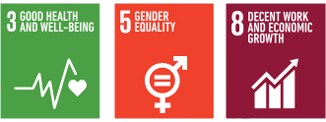
Celebrating diversity and inclusion for a better tomorrow
Occupational health and safety
Labour relations - fair wages
Local sourcing of labour
Talent retention
Creating a safe and healthy workplace
Investing in people and striving to be employer of choice
Care for the communities and people we reach in our operating areas through our CSR practices
Human resource has always been a key differentiator for Tata Steel. Our ability to deliver long-term value rests on the principles of participative management. This culture of working together – management and union – has ensured over 92 years of industrial harmony. Our culture exemplifies our core values and nurtures innovation, creativity and diversity. It encourages high performance through continuous development and opportunities for growth, enhancing engagement and experience through our distinctive reward and recognition programmes.
Best Workplace in Manufacturing Sector in India
Improve employee productivity
25% diversity in workforce by 2025
To be a benchmark in employee engagement and experience
The pandemic has accelerated workplace transformations worldwide. We brought digitalisation into sharp focus to ensure employee safety through data driven decision-making. We also worked relentlessly towards ensuring our employees’ well-being, both physical and mental, by encouraging them to use the Employee Assistance Programmes (EAPs). For ensuring business continuity, several initiatives were introduced:
Agile working policy – among the first across industry to enable employees to work remotely from anywhere in India
Connected workforce system – to enable real-time tracking and access control of workforce to ensure safety and well-being during the pandemic
POD working system – an innovative manpower modularisation; each 'POD' comprises a self-sufficient group with operation and maintenance workforce; 4,000+ PODs created in less than two weeks across locations
Rewards Hub – launched a one-stop platform for accessing all officers related policies and benefits
Introduction of employee net promoter score to measure employee experience across key touchpoints
People Care, 24x7 COVID-19 helpline was introduced to support employees during the pandemic
Digital onboarding and induction programme for ~450 trainees; 62,000+ e-learning assignments
Advocated for 12-hour shift and received approval from Government of Jharkhand
Tata Steel was recognised by the United Nations Global Compact Network India for its efforts on ‘Being Focused on People during and post COVID-19'.
Our safety governance structure is driven by the Safety Health & Environment committee of the Board (chaired by an independent director) and the Apex Safety Council (chaired by CEO & MD). The Safety Excellence Journey (SEJ) committee (chaired by Vice President, Safety Health & Sustainability) under the guidance of the Apex Safety Council works for policy formulations. Their directives are cascaded through the six Apex Safety subcommittees (each chaired by one Vice President), which further cascades to Divisional Implementation Committees (chaired by respective divisional Vice President) and Area Implementation Committees (chaired by department chiefs). Execution of leadership directives is ensured through robust review mechanism across the organisation.
We have been working on six safety strategies – build safety leadership capability at all levels to achieve zero harm, strengthen deployment of contractor safety management standard, improve competency and capability for hazard identification and risk management, improve road and rail safety, excellence in process safety management, and establish industrial hygiene and improve occupational health. The enablers of different strategies are embedded with the executive's annual performance contract and are linked with remuneration.

Impact created
(FY20: 127, FY21: 95) Reduction in lost time injuries
(FY20: 346, FY21: 287) Reduction in first aid cases
(FY20: 08, FY21: 01) Reduction in Process Red Risk Incidents
(FY20: 52, FY21: 20) Reduction in Red Risk Incidents
Past fatal incidents recommendations have been implemented at 3,235 identified locations
Workforce trained on standard operating guideline for COVID-19

Impact created
Workforce members trained on various safety standards at Safety Leadership Development Centre
Employees trained on simplified safety standard through E-learning modules

Impact created
High-risk job vendors were assessed across locations; 68 were approved for 4-star rating and one for 5-star rating
Training modules for critical equipment and process were developed under the Vendor Skilling-2.0 programme, leading to 311 contractor employees being certified as multi-skilled
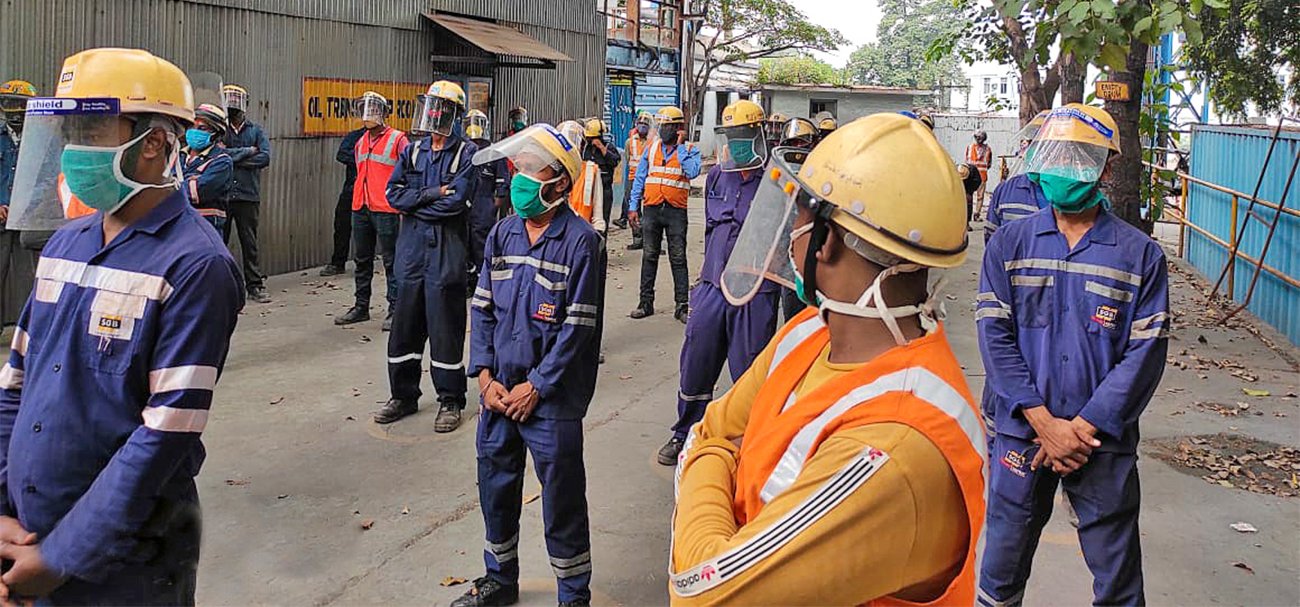
Ensuring COVID-19 safety protocols across our operating locations

Impact created
Zero road fatalities sustained over the last six years
Deployment of model loading /unloading point at 13 locations
Deployment of Driver’s Fatigue Monitoring System (DFMS) for heavy vehicle safety

Impact created
Tata Steel received Safety and Health Recognition 2020 from worldsteel for its Best Practice in ‘Digitalisation of Process Safety Performance Indicators’ at the latter’s Safety and Health Recognition 2020
The Process Safety Management Centre of Excellence (PSM CoE) concept has been rolled out in 14 new departments across Tata Steel

Impact created
56% of the high-risk cases were transferred to moderate or low risk with changes in their lifestyle
Health Index improved from 12.70 in FY 2019-20 to 12.83 in FY 2020-21
Workplace ergonomic risk factors reduced through 47 ergonomic control measures
Actual exposure level of occupational health-related hazards were accurately assessed in 12 departments through a Quantitative Industrial Hygiene Assessment
 Good if increases
Good if increases
 Good if decreases
Good if decreases




Tata Steel has a ‘Workforce Capability and Capacity Framework’ to assess capability needs across the workforce for skill and competence building, customer focus, organisational performance, innovation, health, safety, environment, and business ethics. In line with the changing business needs, we evaluate and improve our training infrastructure, methodologies and programmes. State-of-the-art ‘smart class infrastructure’, connecting training centres across locations, have been installed at six training locations, in line with the need to build a futureready workforce. Customised awareness programmes and focussed campaigns on relevant aspects of sustainability were conducted for our employees and for our extended ecosystem of suppliers and the community. Through various online training interventions, despite the challenges posed by the COVID-19 outbreak, the training reach increased from 54% in FY 2019-20 to 73% in FY 2020-21 (with 100% reach/coverage for officers). Initiatives such as the School of Excellence (SOE) were strengthened in prioritised areas of Steel Plant Operations and Maintenance with the objective of developing world-class technical competencies in our employees. During FY 2020-21 SOEs were made operational.
Tata Steel Digi-e-Shala was launched in July 2020, for students, working professionals and organisations, with an aim to offer learning and development services to the external world. In view of the unprecedented COVID-19 situation, these e-learning initiatives were offered free of cost to the stakeholders. 26 Tata Group companies benefited from this initiative with ~7,000 unique employees enrolled for the e-learning modules.
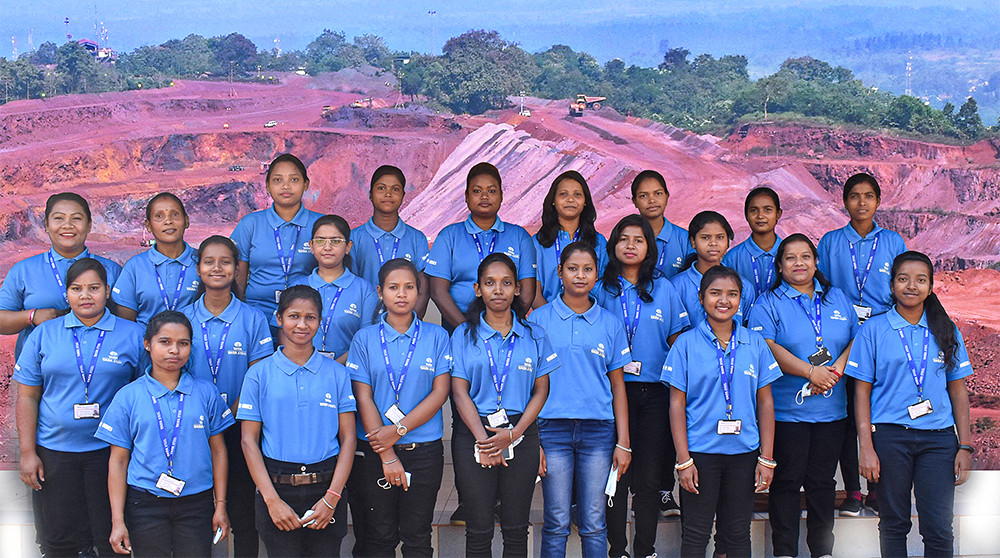
The first batch of 22 women heavy machinery operators at our Noamundi iron mine
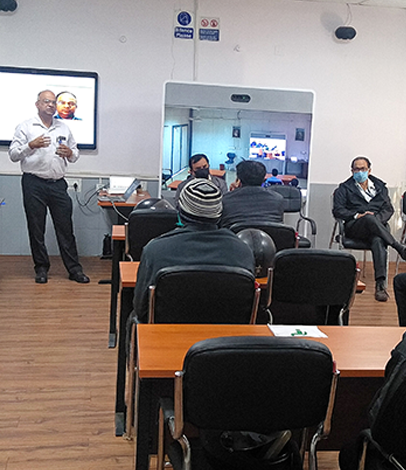
State-of-the-art 'smart class infrastructure'
Diversity and inclusion is a way of life to ensure fair and equal opportunity for all employees. MOSAIC (the Diversity and Inclusion Committee) drives diversity and inclusion indicatives across the four aspects of Gender, Person with Disabilities (PwDs), LGBTQ+, and different sections of society (e.g., Affirmative Action Community). During FY 2020-21, we deployed the first batch of 22 women as heavy machinery operators at the Noamundi iron mine, ensured active presence in Tata group’s ‘We@ Tata’ programmes, and introduced physical and digital infrastructural changes to make the workplace more inclusive. Continuous efforts are also being made on hiring as well as retaining and developing women leaders, which have led to an increase in gender diversity and a reduction in attrition of female employees from 8% to 6%.
Unique policies to drive diversity and inclusion:
Menstrual Leave Policy, Employee Resource Group ‘WINGS’ for LGBTQ+ and Take Two Policy.
Policy rolled out on equal rights for LGBTQ+ employees to enable partners of our colleagues to avail all benefits meant for spouse
Launched 'Indradhanush ke kai Rang' – a campaign to celebrate LGBTQ+ community

We continued on our productivity improvement journey through various focussed initiatives. To remain competitive, improving productivity is of utmost importance. We continue to strive to achieve benchmark performance in this area. Technology and Agility played a crucial role in minimising the impact of COVID-19 on the organisational performance with our productivity remaining at 745 tonne/employee/year. During FY 2020-21, we undertook several initiatives such as throughput improvement and other operational excellence projects, value engineering, cycle time reduction, along with efforts to identify redundancy through right skilling, Sunhere Bhavishya Ki Yojna (SBKY). We also made significant progress in simplifying the organisation’s structure, systems and processes. Employees were also sensitised on productivity improvement through various programmes.

Certified as India's Best Workplaces by 'Great Place to work' under the category of 'Large Organisation' for the 4th time
Adjudged as one of the winners of India’s Best Manufacturing Workplaces in Manufacturing 2021 by the Great Place to Work Institute for the 4th time
Recognised as IWEI’s Top Employers 2020 for the commitment demonstrated to advancing equality for LGBT+ community
Digi-e-shala won the Steelie Award 2020 constituted by World Steel Association for Excellence in Education and Training
Won the regional championship in both student and industry category in Steel Challenge-14 on virtual steelmaking organised by worldsteel
Recognised in three categories at DivHERsity Award, 2021: DivHERsity Policies, Women Returnee Program and Women L&D Program
 Good if increases
Good if increases
 Good if decreases
Good if decreases

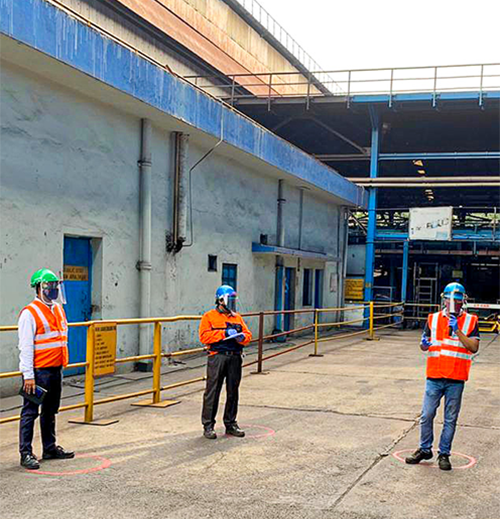
Tata Steel is committed to upholding human rights across its value chain. Our commitment is reflected in the due diligence and implementation framework, governed by the following policies: (for more information, visit www.tatasteel.com).
Tata Code of Conduct (TCoC)
Social Accountability Policy
Responsible Supply Chain Policy
Corporate Social Responsibility (CSR) Policy
Affirmative Action Policy
Prevention of Sexual Harassment (POSH) and Anti Sexual Harassment Initiative (ASHI)
Safety Principles and Occupational Health Policy
Data Privacy Policy
Whistleblower Policy
Equal Opportunity Employer Policy
We actively seek to strengthen our mechanism to prevent and mitigate adverse human rights issues through SA8000 audits of our workplace. Appropriate corrective and remedial measures (checks and balances) have been identified to address any non-compliances. Tata Steel Jamshedpur Works underwent SA8000 recertification audit in FY 2019-20, and successfully retained the certification till July 2022.
Tata Steel is an equal opportunity employer and does not discriminate on the basis of gender, caste, religion or disability. During recruitments, we exercise positive discrimination in favour of socially disadvantaged communities, provided the candidates fulfil our merit-based criteria. Our systems and processes in this regard are monitored for compliance and are subject to continuous improvements through the SA8000 standards and third-party verification. MOSAIC sensitises the workforce to undertake initiatives on promoting diversity
A dedicated contractor’s cell was established to ensure that no human rights violations take place at the workplace. The cell also looks at corrective and preventive measures to deal with cases of violations of our TCoC and Social Accountability Policy. The contractor safety management process ensures that a safe and healthy workplace is provided to the entire contract workforce. Periodic assessments and ratings are carried out to upgrade the contractor’s safety standards.
The Tata Steel Responsible Supply Chain Policy (released in 2020) sets out the expectations and minimum standards on fair business practices, health & safety, human rights and environmental performance that our supply chain partners need to adhere. During FY 2020-21, we engaged with our supply chain partners through awareness sessions and assessments based on the policy requirements. Specific corrective action plans have been identified based on non-compliance to the requirements of four principles of the policy (including human rights) and we are working with our supply chain partners to address these. These principles also form a critical part of our Business Associates Code of Conduct and all our business associates (includes supply chain partners) are mandated to endorse it before working with Tata Steel.
Tata Steel’s operations require significant resettlement and rehabilitation of indigenous communities residing in proximity of its operating sites. Our Affirmative Action Policy and Corporate Social Responsibility and Accountability Policy lay down the rules of engagement with the affected parties. The CSR team ensures that Tata Steel upholds the highest standards of human rights as part of rehabilitation and resettlement, both before and after project completion.